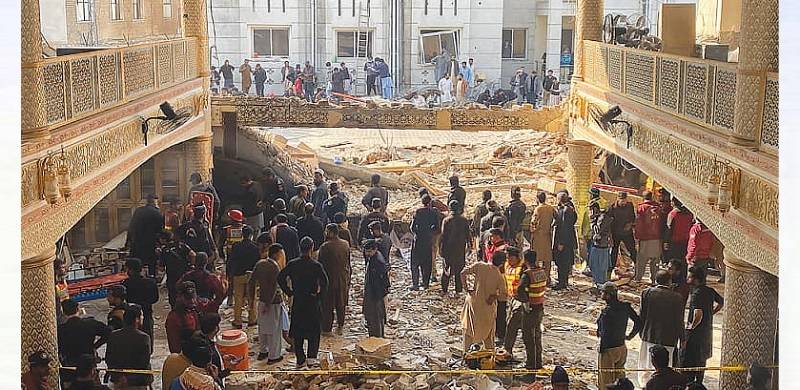
Political leaders on Wednesday demanded the government to adopt a concrete strategy against militants in order to eliminate the scourge of terrorism, once and for all.
On Monday, some 100 people were martyred, and many others injured as a suicide bomber exploded himself in a mosque situated near Peshawar’s Police Lines.
The attacker was present in the front row during Zuhr prayers when he exploded himself, killing dozens of faithful and injuring many others, who were treated at the Lady Reading Hospital of Peshawar.
Condemning the attack, Dr Mohammad Ali Khan, President Pakhtunkhwa Milli Awami Party, KP said the state apparatus failed to implement National Action Plan (NAP) earlier evolved against terrorism.
The suggested plan, he maintained, is already articulated and documented to deal with the situation.
Ali regretted that for the past four decades, the Pashtun land had been subjected to the bloodshed. He sad that it was because of the reason that the state became part of the proxy wars of international and regional powers in Afghanistan.
Many factors and vested interests are involved in this gruesome play. Apart from international interests, the internal tug-of-war between the establishment and democratic forces further complicated it.
"The situation needs more than just half-hearted administrative actions," Khan stressed.
Pointing out that the primary victims of violence and terrorism were Pashtuns, he requested the state to listen to them. He reminded that in March last year, his party organised a 'grand jirga' of the community with representation from all walks of life.
For three days, the body deliberated on the political and security issues and presented its suggestions in the form of various resolutions, he said.
A day earlier, President Arif Alvi summoned a joint session of the Parliament on February 8, as lawmakers asked for holding the crucial talk amid the deadly bombing in Peshawar that claimed 100 lives.
Senators had asked the government to summon the session in view of the terror incidents, inflation and the recent wheat flour crisis.
They had called for developing a plan to fight terrorism and finding out a way to deal with the issue.
On Monday, some 100 people were martyred, and many others injured as a suicide bomber exploded himself in a mosque situated near Peshawar’s Police Lines.
The attacker was present in the front row during Zuhr prayers when he exploded himself, killing dozens of faithful and injuring many others, who were treated at the Lady Reading Hospital of Peshawar.
Condemning the attack, Dr Mohammad Ali Khan, President Pakhtunkhwa Milli Awami Party, KP said the state apparatus failed to implement National Action Plan (NAP) earlier evolved against terrorism.
The suggested plan, he maintained, is already articulated and documented to deal with the situation.
Ali regretted that for the past four decades, the Pashtun land had been subjected to the bloodshed. He sad that it was because of the reason that the state became part of the proxy wars of international and regional powers in Afghanistan.
Many factors and vested interests are involved in this gruesome play. Apart from international interests, the internal tug-of-war between the establishment and democratic forces further complicated it.
"The situation needs more than just half-hearted administrative actions," Khan stressed.
Pointing out that the primary victims of violence and terrorism were Pashtuns, he requested the state to listen to them. He reminded that in March last year, his party organised a 'grand jirga' of the community with representation from all walks of life.
For three days, the body deliberated on the political and security issues and presented its suggestions in the form of various resolutions, he said.
A day earlier, President Arif Alvi summoned a joint session of the Parliament on February 8, as lawmakers asked for holding the crucial talk amid the deadly bombing in Peshawar that claimed 100 lives.
Senators had asked the government to summon the session in view of the terror incidents, inflation and the recent wheat flour crisis.
They had called for developing a plan to fight terrorism and finding out a way to deal with the issue.

